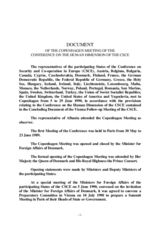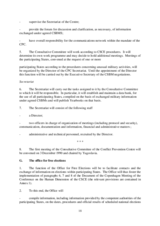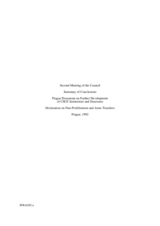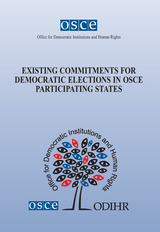-
Our work
-
Fields of work
- Arms control
- Border management
- Combating trafficking in human beings
- Conflict prevention and resolution
- Countering terrorism
- Cyber/ICT Security
- Democratization
- Economic activities
- Education
- Elections
- Environmental activities
- Gender equality
- Good governance
- Human rights
- Media freedom and development
- Migration
- National minority issues
- Policing
- Reform and co-operation in the security sector
- Roma and Sinti
- Rule of law
- Tolerance and non-discrimination
- Youth
- Field operations
- Projects
-
Meetings and conferences
- Summit meetings
- Review Conferences
- Ministerial Council meetings
- Plenary meetings of the Permanent Council
- Plenary Meetings of the Forum for Security Co-operation
- Security Review Conferences
- Annual Implementation Assessment Meetings
- Economic and Environmental Forum
- Economic and Environmental Dimension Implementation Meetings
- Human rights meetings
- Media conferences
- Cyber/ICT security conferences
- Conference of the Alliance against Trafficking in Persons
- Gender equality conferences
- Annual OSCE Mediterranean conferences
- Annual OSCE Asian conferences
- Partnerships
-
Fields of work
-
Countries
- All
-
Participating States
- Albania
- Andorra
- Armenia
- Austria
- Azerbaijan
- Belgium
- Belarus
- Bosnia and Herzegovina
- Bulgaria
- Canada
- Croatia
- Cyprus
- Czechia
- Denmark
- Estonia
- Finland
- France
- Georgia
- Germany
- Greece
- Holy See
- Hungary
- Iceland
- Ireland
- Italy
- Kazakhstan
- Kyrgyzstan
- Latvia
- Liechtenstein
- Lithuania
- Luxembourg
- Malta
- Moldova
- Monaco
- Mongolia
- Montenegro
- The Netherlands
- North Macedonia
- Norway
- Poland
- Portugal
- Romania
- Russian Federation
- San Marino
- Serbia
- Slovakia
- Slovenia
- Spain
- Sweden
- Switzerland – OSCE Chairpersonship 2026
- Tajikistan
- Türkiye
- Turkmenistan
- Ukraine
- United Kingdom
- United States of America
- Uzbekistan
- Asian Partners for Co-operation
- Mediterranean Partners for Co-operation
-
Structures and institutions
- Chairpersonship
-
Secretariat
- Secretary General
- Office of the Secretary General
- Conflict Prevention Centre
- Transnational Threats Department
- Office of the Special Representative and Co-ordinator for Combating Trafficking in Human Beings
- Office of the Co-ordinator of OSCE Economic and Environmental Activities
- Gender Issues Programme
- Opportunities for Youth
- Department of Human Resources
- Department of Management and Finance
- Office of Internal Oversight
- Documentation Centre in Prague
- Institutions
-
Field operations
- Presence in Albania
- Centre in Ashgabat
- Programme Office in Astana
- Programme Office in Bishkek
- Mission to Bosnia and Herzegovina
- Programme Office in Dushanbe
- Mission in Kosovo
- Mission to Moldova
- Mission to Montenegro
- Mission to Serbia
- Mission to Skopje
- Project Co-ordinator in Uzbekistan
- Closed field activities
- Parliamentary Assembly
- Court of Conciliation and Arbitration
- Organizational structure
- About us
Our mandate on elections
Copenhagen Meeting Document
Document of the Copenhagen Meeting of the Conference on the Human Dimension of the CSCE
29 June 1990
In the 1990 Copenhagen Document, the participating States spelled out unequivocally their commitment to elections, by stating that “the will of the people, freely and fairly expressed through periodic and genuine elections, is the basis of the authority and legitimacy of all government”. The Document also clearly provides for the presence of observers, both foreign and domestic, to “enhance the electoral process for States in which elections are taking place” and “invite observers from any other CSCECSCE
Conference on Security and Co-operation in Europe participating States and any appropriate private institutions and organizations who may wish to do so to observe the course of their national election proceedings“.
Establishment of ODIHR
Establishment of the Office for Free Elections (ODIHR)
21 November 1990
During the move in the early 1990s to institutionalize the CSCE, in particular, at the 1990 Paris Summit meeting of Heads of State or Government, the participating States decided to establish an Office for Free Elections in Warsaw. Its function at the time was fairly limited and included mainly “to facilitate contacts and the exchange of information on elections within participating States”. Its work was to compile information on elections and election observations, facilitate contact among governments and other stakeholders, and organize seminars on election procedures and democratic institutions.
Prague Document
Final Document of the Second Meeting of the CSCE Council of Ministers, Prague
31 January 1992
The 1992 Ministerial Council meeting in Prague considerably expanded the functions of the Office for Free Elections, transforming it into the Office for Democratic Institutions and Human Rights. Among other issues, the ministers tasked the Office to “serve as an institutional framework for sharing and exchanging information on available technical assistance, expertise, and national and international programmes aimed at assisting the new democracies in their institution-building“.
Commitments for Democratic Elections
Existing Commitments for Democratic Elections in OSCE Participating States
6 October 2003
In the following years, a plethora of additional commitments were added to the original set, providing the OSCE with a comprehensive framework on elections as democratic practice and election observation. The Office for Democratic Institutions and Human Rights put together an inventory of these commitments and principles in 2003.



